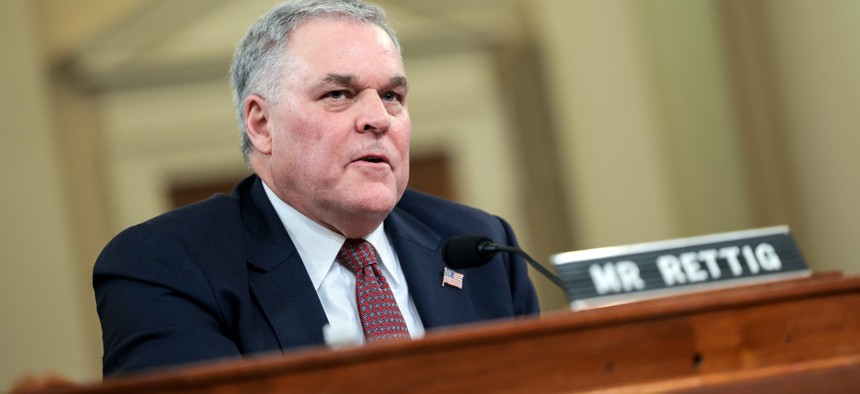
IRS Commissioner Charles Rettig testifies on Capitol Hill in March. Kevin Dietsch/Getty Images
Even As the IRS Hires Thousands, Some Taxpayers Should Expect a Long Wait for Returns
The IRS chief and the agency's top taxpayer advocate warn of shortfalls in the midst of tax season.
The Internal Revenue Service is halfway to meeting its ambitious hiring goals for the current fiscal year, the agency’s commissioner told lawmakers on Thursday, but still cannot assuage concerns that tax return backlogs and customer service wait times will continue to balloon.
The 9 million Americans who have so far used paper forms to file their 2022 taxes will wait an average of six months for their returns, National Taxpayer Advocate Erin Collins told members of the House Oversight and Government Reform Committee. While mandatory overtime for 6,000 employees, surge team deployments and a hiring influx have reduced the existing backlog, IRS still has 6 million returns from 2021. The number of paper filings in 2022 and the manual procedure through which IRS processes them will make it difficult for the agency to dig out from that hole, Collins said.
IRS Commissioner Charles Rettig recently announced a plan to bring on 10,000 new employees over the next two years to address the crisis. Congress “rescued” the agency from “death” when it provided direct hiring authority in March, Rettig said, allowing it to already bring on 2,500 tax examiners and clerks on the way toward its goal of 5,000 new employees by the end of September. IRS has held job fairs and has hired 90% of those who show up since receiving access to the special hiring mechanism, the commissioner added.
Congress also provided IRS with a funding increase of $675 million as part of the fiscal 2022 omnibus spending bill, the largest bump since 2001. President Biden requested an additional 18% bump for fiscal 2023, and has sought an $80 billion surge over 10 years as part of his larger social and climate spending package.
Republicans pushed back on the need for more spending at IRS, saying the agency must learn to be more efficient.
“More funding alone is far, far too simplistic of an answer,” said Rep. Jody Hice, R-Ga., the top Republican on the Government Operations Subcommittee that held Thursday’s hearing. He accused Democrats of suggesting that “just throwing more money at IRS will somehow solve all the IRS’ problems” and asked, “How could anyone possibly come to that conclusion?”
Collins stressed that more funding must be part of the solution, saying IRS is still dealing with a "toxic combination" of office closures during the pandemic, inadequate staffing and the diversion of resources away from core work to process COVID-19 relief efforts such as stimulus payments and child tax credits. That has led to an “unprecedented imbalance between the IRS’ workload and the resources it has available to do the work."
Rettig projected IRS is still facing a $100 million shortfall for operations support in the current fiscal year, warning the agency will have to make cuts elsewhere in its budget if the situation is not addressed.







